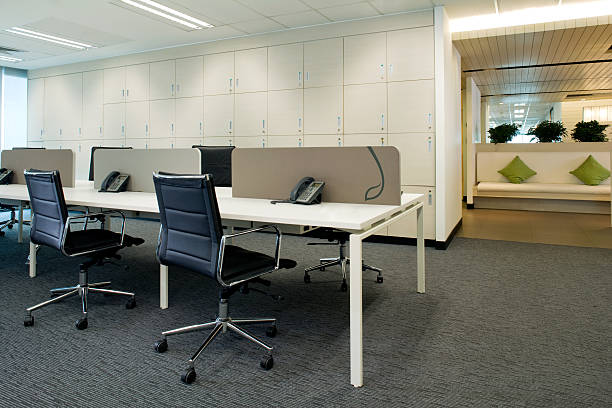Table of Contents
Growing businesses in the UK face many challenges, from managing increasing operational costs to attracting and retaining top talent. One of the most significant hurdles is finding the right workspace that accommodates current needs and supports future growth.
Innovative and optimised workspace solutions are crucial in fostering growth and productivity. They provide the flexibility that growing businesses need to adapt quickly to market changes, support diverse working styles, and optimize operational costs.

The Changing Landscape of Workspaces
The landscape of workspaces is undergoing a significant transformation. Traditional office spaces, characterized by fixed layouts and long-term leases, are becoming less appealing to modern businesses.
The rise of technology and the shift towards remote work have redefined workspace needs, emphasizing flexibility, connectivity, and adaptability.
Advanced communication tools, cloud-based services, and collaborative software have enabled remote work, making it possible for employees to work from anywhere.
This shift has led to the demand for flexible workspaces that can support both in-office and remote working models. As a result, businesses are increasingly turning to innovative workspace solutions that offer the agility and resources needed to thrive in a digital-first world.
Types of Innovative Workspace Solutions
-
Co-working Spaces
Co-working spaces are shared workspaces that provide a flexible and cost-effective solution for startups and small businesses.
They offer a collaborative environment where individuals from different companies can work alongside each other, fostering networking and idea exchange.
Benefits of co-working spaces include access to high-quality amenities, flexible membership plans, and a vibrant community.

-
Serviced Offices
Serviced offices are ideal for businesses in transition or expansion phases, as they offer short-term leases and the ability to scale up or down as needed.
Serviced offices are fully furnished and equipped office spaces managed by an external company. They provide flexibility and a range of amenities, such as reception services, meeting rooms, and IT support.

-
Virtual Offices
Virtual offices provide businesses with a professional address and access to essential services without the need for a physical office space.
This solution is particularly beneficial for remote and hybrid work models, offering services such as mail handling, call answering, and meeting room access. Virtual offices allow businesses to maintain a professional image while reducing overhead costs.

-
Hybrid Workspaces
Hybrid workspaces combine elements of remote and in-office work, providing flexibility for employees to choose where they work. These spaces are designed to support both collaborative and independent work, featuring areas for team meetings, individual workstations, and remote work technology.
Implementing hybrid workspaces effectively involves creating a balanced environment that meets the needs of both in-office and remote workers. This can be achieved through thoughtful design of remote teams, investment in technology, and clear policies that promote flexibility and productivity.

Flexible Workspace Solutions
Flexibility in workspaces refers to the ability to adapt the physical environment and the terms of usage to meet the evolving needs of a business. Flexible workspaces can be easily reconfigured to accommodate different work styles, team sizes, and operational changes.
This adaptability is crucial for growing businesses, as it allows them to scale operations up or down without being constrained by traditional long-term leases or fixed office layouts.
Several providers in the UK offer flexible workspace solutions tailored to the needs of modern businesses.
- BizSpace is a leading choice, known for its extensive range of flexible workspaces. They offer a variety of solutions, including offices, studios, industrial units, and co-working spaces, all with flexible terms to accommodate the unique needs of growing businesses.
- WeWork is another prominent provider, recognized for its extensive network of co-working spaces and serviced offices. WeWork offers flexible membership plans and a variety of work environments, making it suitable for startups and established businesses alike.
- Regus provides a wide range of workspace options, from co-working spaces to serviced offices and virtual offices, all with flexible lease terms. This makes Regus a versatile choice for businesses of all sizes.
- The Office Group specializes in stylish and adaptable office spaces that can be tailored to meet the specific needs of businesses. Their workspaces often feature modern design and innovative amenities.
Benefits of Flexible Workspaces for Growing Businesses
Flexible workspaces offer numerous benefits for growing businesses:
- Cost Efficiency: Businesses can avoid the high costs associated with long-term leases and traditional office setups.
- Scalability: Companies can easily scale their workspace up or down based on their needs, ensuring they only pay for the space they use.
- Enhanced Productivity: Flexible workspaces often provide environments designed to boost productivity, with amenities like high-speed internet, meeting rooms, and collaborative areas.
- Attraction and Retention of Talent: Modern and adaptable workspaces appeal to top talent, providing the flexibility and amenities that employees desire.

Choosing the Right Workspace Solution
Selecting the right workspace solution requires careful consideration of various factors. Here are some key aspects to consider:
- Business Size and Growth Plans: Assess the current size of your business and its projected growth to determine the amount of space needed.
- Work Style and Culture: Consider the work styles and preferences of your employees. Do they prefer open collaborative spaces or private offices?
- Budget: Evaluate your budget to ensure the chosen workspace solution is financially sustainable.
- Location: Choose a location that is convenient for your employees and accessible to clients and partners.
- Amenities and Services: Identify the amenities and services that are essential for your operations, such as high-speed internet, meeting rooms, and administrative support.
How To Figure Out the Right Workspace for You
- Conduct a Needs Assessment: Evaluate your current and future workspace requirements by considering team size, work styles, and operational needs.
- Explore Different Options: Research various workspace solutions, such as co-working spaces, serviced offices, and virtual offices, to understand what each offers.
- Visit Potential Workspaces: Schedule tours of potential workspaces to get a firsthand feel of the environment and its suitability for your business.
- Consider Flexibility: Ensure the chosen workspace solution offers flexibility in terms of lease terms and space reconfiguration.
- Seek Employee Input: Involve your employees in the decision-making process to ensure the workspace meets their needs and preferences.
Future Trends in Workspace Solutions
The future of workspaces in the UK is poised for continued evolution, driven by technological advancements and changing work patterns. One key prediction is the increased demand for hybrid workspaces.
The hybrid work model is expected to become more prevalent, with businesses seeking spaces that support both in-office and remote work, allowing for greater flexibility and efficiency.
Sustainable and green workspaces will also see a growing emphasis. There will be an increasing focus on environmentally friendly workspaces that incorporate sustainable design and practices, reflecting the broader trend towards sustainability in business operations.
Author Profile
- Passionate content creator, contributor, freelance writer and content marketing allrounder.
Latest entries
 Business TipsJanuary 28, 2026Gamification in Business: How unique 2D Art Boosts Conversions
Business TipsJanuary 28, 2026Gamification in Business: How unique 2D Art Boosts Conversions Business TipsJanuary 8, 2026The Hidden Pitfalls Of Selling A Business
Business TipsJanuary 8, 2026The Hidden Pitfalls Of Selling A Business FeaturedJuly 31, 2025How Directors Can Earn £1,000 Tax-Free From Their Own Company
FeaturedJuly 31, 2025How Directors Can Earn £1,000 Tax-Free From Their Own Company FeaturedMay 28, 2025Government Unveils Major Crackdown on Tax Avoidance – Up to £6.5 Billion Could Be Reclaimed by 2029
FeaturedMay 28, 2025Government Unveils Major Crackdown on Tax Avoidance – Up to £6.5 Billion Could Be Reclaimed by 2029






